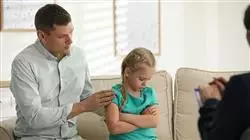University certificate
The world's largest faculty of psychology”
Introduction to the Program
Understanding and knowing how to apply conflict resolution tools is one of the most differentiating skills in a child psychologist and that which distinguishes a good teacher from the rest"

This educational action is oriented to train psychologists more competent and prepared to work in various socio-educational and psycho-pedagogical environments having full knowledge of the most effective techniques in resolving conflicts between children and adolescents. As a result, after completing the specialization, the professional will be fully prepared to take on challenges in this regard, taking the appropriate actions at all times
The teaching staff is made up of working professionals in the sector. In this way, we ensure that we provide you with the up-to-date program we are aiming for. A multidisciplinary team of professors trained and experienced in different environments, who will develop the theoretical knowledge in an efficient manner, but, above all, will put at the service of the program the practical knowledge derived from their own experience: one of the differential qualities of this training
This mastery of the subject is complemented by the effectiveness of the methodological design of this Postgraduate diploma. Developed by a multidisciplinary team of e-Learning experts, it integrates the latest advances in educational technology. This way, you will be able to study with a range of comfortable and versatile multimedia tools that will give you the operability you need in your training
The design of this program is based on Problem-Based Learning: an approach that views learning as a highly practical process. To achieve this remotely, we will use telepractice: With the help of an innovative interactive video system, and Learning from an Expert you will be able to acquire the knowledge as if you were actually dealing with the scenario you are learning about. A concept that will allow you to integrate and fix learning in a more realistic and permanent way
Learn how to make your consulting room a place of development and growth by managing the different contingencies with skill and success"
This Postgraduate diploma in Classroom Conflict Resolution Techniques contains the most complete and up-to-date educational program on the market. The most important features include:
- The development of different practical cases presented by experts in classroom mediation and conflict detection
- The graphic, schematic, and practical contents provide students with scientific and practical information on the disciplines that are essential for professional practice
- New developments in mediation and conflict detection in the consulting room
- Its practical exercises where to perform the self-assessment process to improve learning
- Special emphasis on innovative methodologies in mediation and conflict detection in the consulting room
- Theoretical lessons, questions to the expert, debate forums on controversial topics, and individual reflection assignments
- Content that is accessible from any fixed or portable device with an internet connection
A practical, real-world program that will give you the tools you need to help your patients and their families move forward from conflict in a positive and enriching way"
The program includes, in its teaching staff, professionals belonging to the field of psychology, who bring to this training the experience of their work, in addition to recognized specialists from prestigious reference societies and universities.
The multimedia content, developed with the latest educational technology, will provide the professional with situated and contextual learning, i.e., a simulated environment that will provide immersive education programmed to learn in real situations.
This program is designed around Problem-Based Learning, whereby the specialist must try to solve the different professional practice situations that arise throughout the program. For this purpose, the professional will be assisted by an innovative interactive video system developed by recognized and experienced experts in Conflict Resolution Techniques.
This program comes with the best educational material, providing you with a contextual approach that will facilitate your learning"

This 100% online Postgraduate diploma will allow you to balance your studies with your professional work while expanding your knowledge in this field"
Syllabus
The contents of this program have been developed on the basis of two main objectives: on the one hand, their timeliness and effectiveness, and on the other hand, the students' ability to integrate their learning quickly and efficiently. This combination allows patients to learn progressively and constantly evolving from the first moment to the highest level of competence in this area of work.

A high-level educational program that will allow you to apply new concepts and strategies from the very first moment thanks to its practical and contextual approach"
Module 1. Teacher’s Educational Styles
1.1. Becoming Aware of My Educational Style
1.1.1. Starting by Knowing Oneself
1.1.2. Everyone Educates from their Own Backpack
1.1.3. On the Concept of Authority
1.1.4. Four Educational Styles/Approaches
1.2. Permissive Style
1.2.1. Characteristics of the Cooperative Style
1.2.2. Adult Characteristics
1.2.3. Some Ideas If You Follow this Style
1.2.4. Consequences of this Style with Children
1.3. Overprotective Style
1.3.1. Characteristics of the Cooperative Style
1.3.2. Adult Characteristics
1.3.3. Some Ideas If You Follow this Style
1.3.4. Consequences of this Style with Children
1.4. Authoritarian Style
1.4.1. Characteristics of the Authoritarian Style with Adults
1.4.2. Some Ideas If You Follow this Style
1.4.3. Consequences of this Style with Children
1.5. Cooperative Style
1.5.1. Characteristics of the Cooperative Style
1.5.2. Adult Characteristics
1.5.3. Some Ideas If You Follow this Style
1.5.4. Consequences of this Style with Children
1.6. How to Speak so that Children Listen
1.6.1. Speaking Mechanisms so that Children Listen
1.7. How to Listen so that Children Speak
1.7.1. Speaking Mechanisms so that Children Speak
1.8. Active Listening Based on Validation from Others
1.8.1. Listening through Behavior
1.8.2. Naming Feelings
1.8.3. Discovering Basic Needs
1.8.4. Time to Listen
1.8.5. Establishing Eye Contact
1.9. Steps to Modify the Behavior of My Students
1.9.1. Defining the Problem
1.9.2. Approaching Problems One at a Time
1.9.3. Being Consequential and Consistent
1.9.4. Being Positive
1.9.5. Letting the Child Know What is Expected of Them
1.10. Basic Disciplinary Techniques
1.10.1. How to Give Praise
1.10.2. How to Ignore
1.10.3. How to Reward
1.10.4. How to Reprimand
1.10.5. Time-Out Technique
1.10.6. Problem Chairs
1.10.7. How to Use Overcorrection
Module 2. Communication in Conflict
2.1. Communication
2.1.1. Emitter
2.1.2. Receptor
2.1.3. Message
2.1.4. Communication Channels
2.2. Verbal, Non-Verbal and Paraverbal Communication
2.2.1. Verbal Communication
2.2.2. Non-Verbal Communication
2.2.3. Paraverbal Communication
2.3. Invalidating Communication
2.3.1. I Win/You Lose
2.3.2. You Win/I Lose
2.4. Validating Communication
2.4.1. I Win/You win
2.4.2. I Win and Help You Win
2.5. Choosing Assertive Communication During Conflict
2.5.1. Assertive Communication in Conflicts
2.6. How to Make Healthy Decisions
2.6.1. Healthy Decision-Making
2.7. There are Three Fingers Pointing at Me: Me Because You
2.7.1. Three Fingers Pointed at Me
2.8. Choosing Non-Violence: Non-Violent Communication. Four Versus One
2.8.1. Non-Violent Communication
2.9. Technology at the Service of Communication
2.9.1. Technology and Communication
2.10. Listening and Hearing
2.10.1. Listening
2.10.2. Hearing
Module 3. Ways of Expressing Reached Agreements
3.1. Reaching Agreement
3.1.1. Consensus
3.1.2. Commitment
3.1.3. Voting
3.1.4. Postponing the Decision
3.1.5. Customizable Solution
3.1.6. Arbitration
3.1.7. Lateral Thinking
3.1.8. Plus Minus Interesting (PMI)
3.1.9. Decision-Making Matrix
3.1.10. Negotiation
3.2. Remember Your Goal
3.2.1. The Goal and How to Remember It
3.3. Listen to What the Other Person Is Telling You
3.3.1. Learning to Listen to Others
3.4. Speak for Yourself, Not for Others
3.4.1. How to Speak for Oneself
3.5. Do not Start on Another Melon until you Finish the One you are Eating
3.5.1. How to Finish One Thing Before Starting Another
3.6. Put on Someone Else’s Glasses
3.6.1. How to Put Yourself in the Other’s Place
3.7. Choose the Right Moment to Tell Them
3.7.1. How to Find the Right Moment to Start a Conversation
3.8. Don’t Take It Personally
3.8.1. Don’t Take Matters into Private Domains
3.9. Use the Sandwich Technique (Positive, Critical, Positive)
3.9.1. Definition of the Sandwich Technique
3.10. Express Yourself in Terms of: I Am Very Happy That You Have
3.10.1. Knowledge of Positive Terms

A unique, key and decisive program to boost your professional development”
Postgraduate Diploma in Conflict Resolution Techniques in the Classroom
The Postgraduate Diploma in Conflict Resolution Techniques in the Classroom is a specialized training in the management of conflict situations in the school environment. This program offers specific tools to intervene effectively in situations that require adult mediation, either in the educational context or in the relationship with families.Conflict resolution in the classroom is essential to ensure an adequate and healthy learning environment for all students. With this expert, students will gain advanced knowledge in the field of psychology and pedagogy, to be able to intervene in conflict situations effectively and promote dialogue and cooperation among students.This program is designed to train education professionals, such as teachers, school counselors and psychologists, with the necessary skills to prevent and manage conflicts that may arise in the classroom. In addition, the Postgraduate Diploma addresses issues such as bullying, cyberbullying and other conflict situations that can affect coexistence in the school environment.
Specialize in mediation in the school environment.
The methodology of the program is innovative, with a 100% online approach that allows students to study at their own pace and from anywhere. The content of the expert is updated and taught by professionals with extensive experience in the field of education and psychology. In short, the Postgraduate Diploma in Conflict Resolution Techniques in the Classroom is an essential training for those education professionals who wish to acquire effective tools to intervene in conflict situations and promote a healthy and cooperative learning environment for all students.







